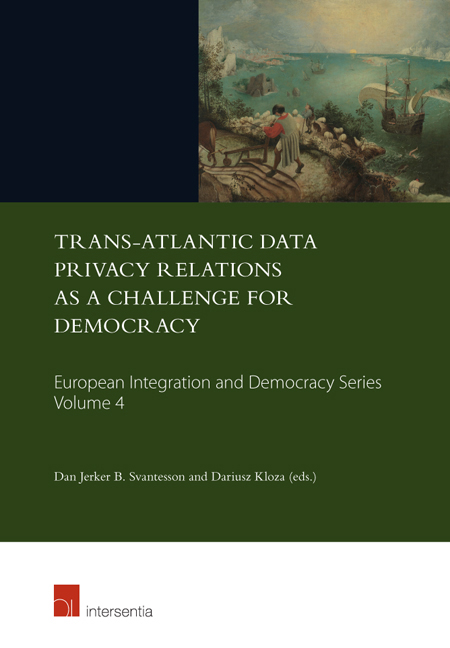Book contents
- Frontmatter
- Foreword
- Preface
- Contents
- List of Abbreviations
- PART I PRIVACY AND …
- SECTION I PRIVACY AND TRANSBORDER FLOWS OF PERSONAL DATA
- INVITED COMMENTS
- SECTION II PRIVACY AND INTERNATIONAL TRADE
- INVITED COMMENT
- 9 Nine Takeaways on Trade and Technology
- SECTION III PRIVACY AND TERRITORIAL APPLICATION OF THE LAW
- SECTION IV PRIVACY AND CRIME
- INVITED COMMENTS
- SECTION V PRIVACY AND TIME INVITED COMMENTS
- PART II THEORY OF PRIVACY
- PART III ALTERNATIVE APPROACHES TO THE PROTECTION OF PRIVACY
- INVITED COMMENT
- CONCLUSION
9 - Nine Takeaways on Trade and Technology
from INVITED COMMENT
Published online by Cambridge University Press: 29 September 2018
- Frontmatter
- Foreword
- Preface
- Contents
- List of Abbreviations
- PART I PRIVACY AND …
- SECTION I PRIVACY AND TRANSBORDER FLOWS OF PERSONAL DATA
- INVITED COMMENTS
- SECTION II PRIVACY AND INTERNATIONAL TRADE
- INVITED COMMENT
- 9 Nine Takeaways on Trade and Technology
- SECTION III PRIVACY AND TERRITORIAL APPLICATION OF THE LAW
- SECTION IV PRIVACY AND CRIME
- INVITED COMMENTS
- SECTION V PRIVACY AND TIME INVITED COMMENTS
- PART II THEORY OF PRIVACY
- PART III ALTERNATIVE APPROACHES TO THE PROTECTION OF PRIVACY
- INVITED COMMENT
- CONCLUSION
Summary
Cross-border trade, (digital) rights and the use and regulation of new technologies increasingly overlap, but discussions about these topics remain fragmented Trade negotiators, civil society organisations, legislators and tech experts try to address the opportunities of the digital economy, Internet governance, the protection of digital rights in various fora – without necessarily having a clear overview of who is doing what.
Some actors have raised concerns about the potential dangers of trade agreements, such as the cementing of outdated copyright rules or the circumvention of privacy standards Others have focused on opportunities to safeguard and strengthen the open Internet, for instance by banning unjustified forced data-localisation or prohibiting online censorship.
Below are my initial takeaways on trade and technology I invite you to share your input about what can work and what does not work, where trade rules can help advance the open Internet, and where we should be careful not to overregulate.
NO OLD-SCHOOL TRADE – VIEWS TO ADDRESS THE DIGITAL ECONOMY OF THE FUTURE
The Internet has fundamentally changed the way companies do business and reach consumers globally Some business models are purely data-driven, or focus only on the provision of digital goods and services Other companies – in sectors ranging from design to legal services – have digitised their services, and used the Internet to profoundly change their business models or value chains Small and medium-sized enterprises are now able to easier find and reach new customers and markets The potential of digitisation processes is clear and goes far beyond only a digital economy.
For the European Union (EU), this increasing digitisation of more traditional aspects of our services economy provides great opportunities Services make up around 70 per cent of the EU's GDP, and they are more oft en being delivered digitally Close to a third of the growth of the overall industrial output in Europe is now a result of the uptake of digital technologies The expectation is that the importance of the digital economy will continue to grow, as more of the world's population gains access to the Internet, and new technologies such as the Internet of Things become more widespread.
- Type
- Chapter
- Information
- Publisher: IntersentiaPrint publication year: 2017

